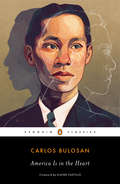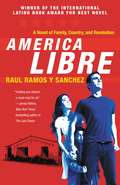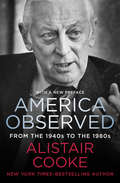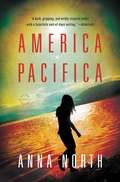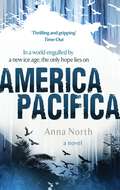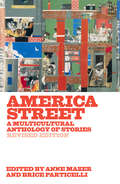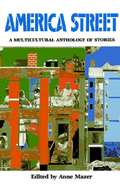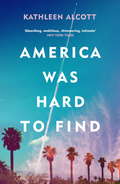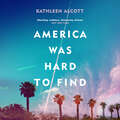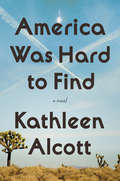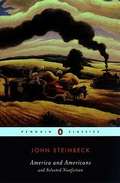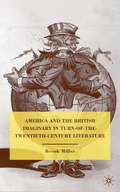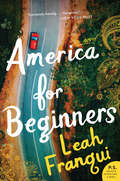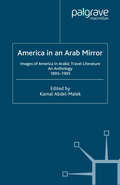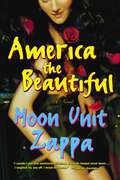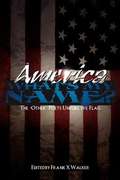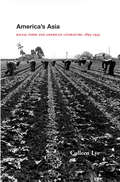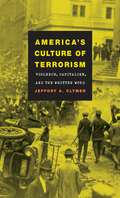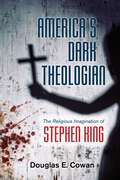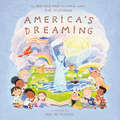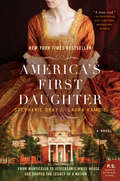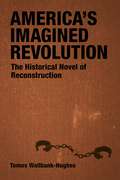- Table View
- List View
America Is in the Heart: A Personal Journey (American Autobiography Ser.)
by Carlos BulosanA 1946 Filipino American social classic about the United States in the 1930s from the perspective of a Filipino migrant laborer who endures racial violence and struggles with the paradox of the American dream, with a foreword by novelist Elaine CastilloPoet, essayist, novelist, fiction writer and labor organizer, Carlos Bulosan (1911-1956) wrote one of the most influential working class literary classics about the U.S. pre-World War II, a period and setting similar to that of Steinbeck's The Grapes of Wrath and Cannery Row. Bulosan's semi-autobiographical novel America is in the Heart begins with the narrator's rural childhood in the Philippines and the struggles of land-poor peasant families affected by US imperialism after the Spanish American War of the late 1890s. Carlos's experiences with other Filipino migrant laborers, who endured intense racial abuse in the fields, orchards, towns, cities and canneries of California and the Pacific Northwest in the 1930s, reexamine the ideals of the American dream. Bulosan was one of the most important 20th century social critics with his deeply moving account of what it was like to be criminalized in the U.S. as a Filipino migrant drawn to the ideals of what America symbolized and committed to social justice for all marginalized groups.Celebrate Asian American and Pacific Islander (AAPI) Heritage Month with these four Penguin Classics: America Is in the Heart by Carlos Bulosan (9780143134039) East Goes West by Younghill Kang (9780143134305) The Hanging on Union Square by H. T. Tsiang (9780143134022) No-No Boy by John Okada (9780143134015)
America Libre (Class H Trilogy #1)
by Raul Ramos y SanchezAfter years of anti-immigrant backlash, anger seethes in the nation's Latino communities. The crowded streets bristle with restless youth, idled by a deep recession. When undercover detectives in San Antonio accidentally kill a young Latina bystander during a botched drug bust, riots erupt across the Southwest. As the inner-city violence escalates, Anglo vigilantes strike back with shooting rampages. Exploiting the turmoil, a congressional demagogue succeeds in passing legislation that transforms the nation's Hispanic enclaves into walled-off Quarantine Zones. Citizens tagged Class H--those who are Hispanic, are married to a Hispanic, or have at least one grandparent of Hispanic origin--are forced into detention centers. Amid the chaos in his L.A. barrio, Manolo Suarez is out of work and struggling to support his growing family. But under the spell of a beautiful Latina radical, the former U.S. Army Ranger and decorated war veteran now finds himself questioning his loyalty to his wife--and to his country.
America Observed: From the 1940s to the 1980s
by Alistair CookeThe definitive survey of Alistair Cooke&’s brilliant career as a newspapermanFew journalists have covered the American scene as thoroughly as Alistair Cooke did. In addition to presenting the Sunday-night Letter from America broadcasts for the BBC, Cooke was the Guardian&’s chief US correspondent for more than a quarter century, filing daily dispatches about the former colonies for his British readers.Selected and introduced by Professor Ronald A. Wells, the pieces in America Observed showcase the full range of Cooke&’s omnivorous interests and impressive reportorial skills. From baseball to Billy Graham, Harry S. Truman to Chappaquiddick, he depicts the defining characters and events of the American century with elegance and insight. &“The Untravelled Road&” is a poignant and perceptive snapshot of the civil rights movement in Montgomery, Alabama. &“The Legend of Gary Cooper&” eloquently summarizes the unlikely career of America&’s leading man, and &“A Woman of Integrity&” delivers the news of Marilyn Monroe&’s death with empathy and honesty. &“The Ghastly Sixties&” is a concise, candid, and ultimately inspirational chronicle of that turbulent decade.Remarkably prescient and endlessly entertaining, the journalism collected here is some of the twentieth century&’s finest.
America Pacifica: A Novel
by Anna NorthEighteen-year-old Darcy lives on the island of America Pacifica--one of the last places on earth that is still habitable, after North America has succumbed to a second ice age. Education, food, and basic means of survival are the province of a chosen few, while the majority of the island residents must struggle to stay alive. The rich live in "Manhattanville" mansions made from the last pieces of wood and stone, while the poor cower in the shantytown slums of "Hell City" and "Little Los Angeles," places built out of heaped up trash that is slowly crumbling into the sea. The island is ruled by a mysterious dictator named Tyson, whose regime is plagued by charges of corruption and conspiracy.But to Darcy, America Pacifica is simply home--the only one she's ever known. In spite of their poverty she lives contentedly with her mother, who works as a pearl diver. It's only when her mother doesn't come home one night that Darcy begins to learn about her past as a former "Mainlander," and her mother's role in the flight from frozen California to America Pacifica. Darcy embarks on a quest to find her mother, navigating the dark underbelly of the island, learning along the way the disturbing truth of Pacifica's early history, the far-reaching influence of its egomaniacal leader, and the possible plot to murder some of the island's first inhabitants--including her mother.
America Pacifica: A Novel
by Anna NorthHundreds of miles off the frozen coast of what was once California is America Pacifica, where those who fled the dawn of the new ice age have tried to recreate their former home . . .America Pacifica is an island hundreds of miles off the coast of California - the only warm place left in a world in the grip of a new ice age. Darcy Pern is seventeen; her mother has gone missing, and the novel details her quest to find out the truth about her disappearance - a quest which soon becomes an investigation of the disturbing origins of America Pacifica itself, and its sinister and reclusive leader, a man known only as Tyson.America Pacifica invites comparison with the work of Margaret Atwood and China Mieville, but also with Cormac McCarthy's The Road, for its post-apocalyptic scenario and the touching relationship between Darcy and her mother, and the Stieg Larsson trilogy for its implacable central character who is determined to uncover the truth.
America Reads: Classic Edition (Classics in World Literature)
by Kerry M. Wood Helen Mcdonnell John Pfordresher Mary Alice Fite Paul LankfordClassics in World Literature has eight chronological units presenting a survey of major authors and literary works from the time of the earliest surviving writings until the present day.
America Reads: Discoveries in Literature (Classic Edition)
by L. Jane Christensen Edmund J. Farrell"Discoveries in Literature" has six units containing short stories, poetry, plays, nonfiction, and folk literature. A seventh unit is made up of a novel, Kavik, the Wolf Dog, and the eighth unit is the story of Ulysses, a famous Greek hero, and his adventures with gods and goddesses.
America Street (Revised Edition): A Multicultural Anthology Of Stories
by Anne Mazer Brice ParticelliPublished in 1993, America Street was the very first collection of stories about young people growing up in our diverse society. It has informed and inspired hundreds of thousands of readers. Now this influential and much-loved anthology is expanded and updated for a new generation. Twenty stories, twelve new and eight returning favorites, focus on life issues, from the personal to the political. Authors included are: Duane Big Eagle, Marina Budhos, Norma Elia Cantú, Sandra Cisneros, Lan Samantha Chang, Tope Folarin, Rivka Galchen, Joseph Geha, Veera Hiranandani, Langston Hughes, Gish Jen, Edward P. Jones, Francisco Jiménez, Mary K. Mazotti, Toshio Mori, Naomi Shihab Nye, Susan Power, Gary Soto, Justin Torres, and Michele Wallace.
America Street: A Multicultural Anthology of Stories
by Anne MazerWelcome to America Street, where every story is as vital and unique as the friends, neighbors, and relatives we encounter every day. Here are fourteen stories about young people told by some of America's best storytellers: Duane Big Eagle, Toni Cade Bambara, Robert Cormier, Langston Hughes, Gish Jen, Francisco Jimenez, Mary K. Mazotti, Nicholasa Mohr, Toshio Mori, Leslie Namioka, Naomi Shihab Nye, Grace Paley, Gary Soto, and Michele Wallace.
America Was Hard to Find
by Kathleen AlcottMojave Desert, 1957.Vincent Kahn is an astronaut in training, living with his wife in the desert. He will go on to be the first man to walk on the moon.Fay Fern is 19-years-old and working in a dive bar, having rejected her parents' wealth and conservatism. She will go on to become a violent activist and one of the FBI's most wanted. The pair's brief but intense love affair will have repercussions that echo through the American century, intersecting with the race to space, the rage against the Vietnam war, and the ravages of the AIDS epidemic.
America Was Hard to Find
by Kathleen AlcottMojave Desert, 1957.Vincent Kahn is an astronaut in training, living with his wife in the desert. He will go on to be the first man to walk on the moon.Fay Fern is 19-years-old and working in a dive bar, having rejected her parents' wealth and conservatism. She will go on to become a violent activist and one of the FBI's most wanted. The pair's brief but intense love affair will have repercussions that echo through the American century, intersecting with the race to space, the rage against the Vietnam war, and the ravages of the AIDS epidemic.
America Was Hard to Find: A Novel
by Kathleen AlcottIn the wake of an affair, the lives of an astronaut and a radical are forever altered by the political fault lines of the 1960s, setting off a series of events ricocheting from anti-Vietnam activism to the Apollo program to the AIDS crisis, in this sprawling multigenerational novelEcuador, 1969: An American expatriate, Fay Fern, sits in the corner of a restaurant, she and her young son Wright turned away from the television where Vincent Kahn becomes the first man to walk on the moon.Years earlier, Fay and Vincent meet at a pilots’ bar in the Mojave Desert. Both seemed poised for reinvention—the married test pilot, Vincent, as an astronaut; the spurned child of privilege, Fay, as an activist. Their casual affair ends quickly, but its consequences linger.Though their lives split, their senses of purpose deepen in tandem, each becoming heroes to different sides of the political spectrum of the 1960s and 70s: Vincent an icon with no plan beyond the mission for which he has single-mindedly trained, Fay a leader of a violent leftist group whose anti-Vietnam actions make her one of the FBI’s most wanted. With her last public appearance, a demonstration that frames the Apollo program as a vehicle for distracting the American public from its country’s atrocities, Fay leaves Wright to contend with her legacy, his own growing apathy, and the misdeeds of both his mother and his country.An immense, vivid reimagining of the Cold War era, America Was Hard to Find traces the fallout of the cultural revolution that divided the country and explores the meaning of individual lives in times of upheaval. It also confirms Kathleen Alcott’s reputation as a fearless and vital voice in fiction.
America and Americans and Selected Nonfiction
by John Steinbeck Susan Shillinglaw Jackson J. BensonMore than four decades after his death, John Steinbeck remains one of the nation's most beloved authors. Yet few know of his career as a journalist who covered world events from the Great Depression to Vietnam. Now, this distinctive collection offers a portrait of the artist as citizen, deeply engaged in the world around him. In addition to the complete text of Steinbeck's last published book, America and Americans, this volume brings together for the first time more than fifty of Steinbeck's finest essays and journalistic pieces on Salinas, Sag Harbor, Arthur Miller, Woody Guthrie, the Vietnam War and more. This edition is edited by Steinbeck scholar Susan Shillinglaw and Steinbeck biographer Jackson J. Benson. .
America and the British Imaginary in Turn-of-the-Twentieth-Century Literature
by Brook MillerIn an innovative reading of fin-de-siecle cultural texts, Miller argues that British representations of America, Americans, and Anglo-American relations at the turn of the twentieth century provided an important forum for cultural distinction.
America for Beginners: A Novel
by Leah FranquiRecalling contemporary classics such as Americanah, Behold the Dreamers, and The Brief Wondrous Life of Oscar Wao, a funny, poignant, and insightful debut novel that explores the complexities of family, immigration, prejudice, and the American Dream through meaningful and unlikely friendships forged in unusual circumstances.Pival Sengupta has done something she never expected: she has booked a trip with the First Class India USA Destination Vacation Tour Company. But unlike other upper-class Indians on a foreign holiday, the recently widowed Pival is not interested in sightseeing. She is traveling thousands of miles from Kolkota to New York on a cross-country journey to California, where she hopes to uncover the truth about her beloved son, Rahi. A year ago Rahi devastated his very traditional parents when he told them he was gay. Then, Pival’s husband, Ram, told her that their son had died suddenly—heartbreaking news she still refuses to accept. Now, with Ram gone, she is going to America to find Rahi, alive and whole or dead and gone, and come to terms with her own life.Arriving in New York, the tour proves to be more complicated than anticipated. Planned by the company’s indefatigable owner, Ronnie Munshi—a hard-working immigrant and entrepreneur hungry for his own taste of the American dream—it is a work of haphazard improvisation. Pival’s guide is the company’s new hire, the guileless and wonderfully resourceful Satya, who has been in America for one year—and has never actually left the five boroughs. For modesty’s sake Pival and Satya will be accompanied by Rebecca Elliot, an aspiring young actress. Eager for a paying gig, she’s along for the ride, because how hard can a two-week "working" vacation traveling across America be?Slowly making her way from coast to coast with her unlikely companions, Pival finds that her understanding of her son—and her hopes of a reunion with him—are challenged by her growing knowledge of his adoptive country. As the bonds between this odd trio deepens, Pival, Satya, and Rebecca learn to see America—and themselves—in different and profound new ways.A bittersweet and bighearted tale of forgiveness, hope, and acceptance, America for Beginners illuminates the unexpected enchantments life can hold, and reminds us that our most precious connections aren’t always the ones we seek.
America in An Arab Mirror: Images of America in Arabic Travel Literature: An Anthology
by K. Abdel-MalekThis distinguished anthology presents for the first time in English travel essays by Arabic writers who have visited America in the second half of the century. The view of America which emerges from these accounts is at once fascinating and illuminating, but never monolithic. The writers hail from a variety of viewpoints, regions, and backgrounds, so their descriptions of America differently engage and revise Arab pre-conceptions of Americans and the West. The country figures as everything from the unchanging Other, the very antithesis of the Arab self, to the seductive female, to the Other who is both praiseworthy and reprehensible.
America the Beautiful in the Words of Walt Whitman
by Editors of Country BeautifulThe editors of Country Beautiful take the readers into the life of Walt Whitman by sharing Whitman’s writings at different levels of his development. Interspersed with his writings, are editorial historical comments that place Whitman’s poems and prose within the appropriate historical context. From this, the readers gain a glimpse into Whitman’s mind, heart, and spirit, and view of social justice. The photographs that the editors chose to put into this volume add to the vibrancy of Whitman’s work.
America the Beautiful: A Novel
by Moon Unit ZappaAmerica Throne is living the good life in L.A. Her career is sprouting, and she is in love -- with Jasper Husch, a sexy-sultry artist from San Fran. But just as soon as they've realized domestic bliss, Jasper has a change of heart, and America falters on the slippery slope of hope: hoping that he will come back, hoping that new sex will erase all evidence of him, and hoping that in nurturing a truce with her dead father she will make peace with all men. America's trip from self-destruction to wholeness is a romp on the wilder shores of the West Coast. From a dodgy therapist to a silent retreat, America Throne's "aha" moment culminates with, "While we are all busy swimming upstream, the universe is conspiring to take us to something better." In America the Beautiful, Moon Zappa has taken the broken-heart story and given it a twist all her own through the emotional honesty and edginess of America Throne. Hailed as "brilliant" (Sunday Telegraph Magazine), America the Beautiful is the debut of an unforgettable and unfaltering new voice.
America! What’s My Name: The "Other" Poets Unfurl the Flag
by Frank X. WalkerA multi-cultural anthology of modern poetry.
America's Asia: Racial Form and American Literature, 1893-1945
by Colleen LyeWhat explains the perception of Asians both as economic exemplars and as threats? America's Asia explores a discursive tradition that affiliates the East with modern efficiency, in contrast to more familiar primitivist forms of Orientalism. Colleen Lye traces the American stereotype of Asians as a "model minority" or a "yellow peril"--two aspects of what she calls "Asiatic racial form"-- to emergent responses to globalization beginning in California in the late nineteenth century, when industrialization proceeded in tandem with the nation's neocolonial expansion beyond its continental frontier. From Progressive efforts to regulate corporate monopoly to New Deal contentions with the crisis of the Great Depression, a particular racial mode of social redress explains why turn-of-the-century radicals and reformers united around Asian exclusion and why Japanese American internment during World War II was a liberal initiative. In Lye's reconstructed archive of Asian American racialization, literary naturalism and its conventions of representing capitalist abstraction provide key historiographical evidence. Arguing for the profound influence of literature on policymaking, America's Asia examines the relationship between Jack London and leading Progressive George Kennan on U.S.-Japan relations, Frank Norris and AFL leader Samuel Gompers on cheap immigrant labor, Pearl S. Buck and journalist Edgar Snow on the Popular Front in China, and John Steinbeck and left intellectual Carey McWilliams on Japanese American internment. Lye's materialist approach to the construction of race succeeds in locating racialization as part of a wider ideological pattern and in distinguishing between its different, and sometimes opposing, historical effects.
America's Culture of Terrorism
by Jeffory A. ClymerAlthough the terrorist attacks of 11 September 2001 shocked the world, America has confronted terrorism at home for well over a century. With the invention of dynamite in 1866, Americans began to worry about anonymous acts of mass violence in a way that differed from previous generations' fears of urban riots, slave uprisings, and mob violence. Focusing on the volatile period between the 1886 Haymarket bombing and the 1920 bombing outside J. P. Morgan's Wall Street office, Jeffory Clymer argues that economic and cultural displacements caused by the expansion of industrial capitalism directly influenced evolving ideas about terrorism.In America's Culture of Terrorism, Clymer uncovers the roots of American terrorism and its impact on American identity by exploring the literary works of Henry James, Ida B. Wells, Jack London, Thomas Dixon, and Covington Hall, as well as trial transcripts, media reports, and the cultural rhetoric surrounding terrorist acts of the day. He demonstrates that the rise of mass media and the pressures of the industrial wage-labor economy both fueled the development of terrorism and shaped society's response to it. His analysis not only sheds new light on American literature and culture a century ago but also offers insights into the contemporary understanding of terrorism.
America's Dark Theologian: The Religious Imagination of Stephen King
by Douglas E. CowanIlluminating the religious and existential themes in Stephen King’s horror stories Who are we? Why are we here? Where do we go when we die? For answers to these questions, people often look to religion. But religion is not the only place seekers turn. Myths, legends, and other stories have given us alternative ways to address the fundamental quandaries of existence. Horror stories, in particular, with their focus on questions of violence and mortality, speak urgently to the primal fears embedded in such existential mysteries. With more than fifty novels to his name, and hundreds of millions of copies sold, few writers have spent more time contemplating those fears than Stephen King. Yet despite being one of the most widely read authors of all time, King is woefully understudied. America’s Dark Theologian is the first in-depth investigation into how King treats religion in his horror fiction. Considering works such as Carrie, The Dead Zone, Misery, The Shining, and many more, Douglas Cowan explores the religious imagery, themes, characters, and, most importantly, questions that haunt Stephen King’s horror stories. Religion and its trappings are found throughout King’s fiction, but what Cowan reveals is a writer skeptical of the certainty of religious belief. Describing himself as a “fallen away” Methodist, King is less concerned with providing answers to our questions, than constantly challenging both those who claim to have answers and the answers they proclaim. Whether he is pondering the existence of other worlds, exploring the origins of religious belief and how it is passed on, probing the nature of the religious experience, or contemplating the existence of God, King invites us to question everything we think we know.
America's Dreaming
by Bob McKinnonFrom New York Times bestselling author Bob McKinnon comes a story about seeking inspiration from our past to become our best selves in the future.Have you ever felt alone? Have you ever desperately wanted to fit in? America understands how you feel.America dreams of adventures, making new friends, and being strong. But America&’s first day at a new school turns out to be a nightmare.Fortunately, America&’s new teacher introduces the Welcome Wagon—a cart filled with books about real-life historical figures who also had trouble feeling accepted. When America falls asleep that night, Amelia Earhart, Sojourner Truth, Martin Luther King Jr., and Emma Lazarus jump off the pages to share their stories—inspiring America to return to school the next day and make their dreams come true.While we never see America, Bob McKinnon&’s lyrical writing and Thai My Phuong&’s unique, sweeping art helps readers see the world through America&’s eyes and encourages us all to be as kind as we are brave, because everyone always deserves to feel welcome.
America's First Daughter
by Stephanie Dray Laura KamoieIn a compelling, richly researched novel that draws from thousands of letters and original sources, bestselling authors Stephanie Dray and Laura Kamoie tell the fascinating, untold story of Thomas Jefferson's eldest daughter, Martha "Patsy" Jefferson Randolph--a woman who kept the secrets of our most enigmatic founding father and shaped an American legacy.<P><P> From her earliest days, Patsy Jefferson knows that though her father loves his family dearly, his devotion to his country runs deeper still. As Thomas Jefferson's oldest daughter, she becomes his helpmate, protector, and constant companion in the wake of her mother's death, traveling with him when he becomes American minister to France.<P> It is in Paris, at the glittering court and among the first tumultuous days of revolution, that fifteen-year-old Patsy learns about her father's troubling liaison with Sally Hemings, a slave girl her own age. Meanwhile, Patsy has fallen in love--with her father's protégé William Short, a staunch abolitionist and ambitious diplomat. Torn between love, principles, and the bonds of family, Patsy questions whether she can choose a life as William's wife and still be a devoted daughter.<P> Her choice will follow her in the years to come, to Virginia farmland, Monticello, and even the White House. And as scandal, tragedy, and poverty threaten her family, Patsy must decide how much she will sacrifice to protect her father's reputation, in the process defining not just his political legacy, but that of the nation he founded. <P><b>A New York Times Bestseller</b>
America's Imagined Revolution: The Historical Novel of Reconstruction (Southern Literary Studies)
by Tomos Wallbank-HughesAmerica’s Imagined Revolution explores the Reconstruction period after the Civil War to ask narratological, historiographical, and theoretical questions about how slave emancipation has (and has not) been theorized as revolution. Reading historical fiction by authors such as George Washington Cable, Albion Tourgée, Charles Chesnutt, Frances Harper, and W. E. B. Du Bois in dialogue with nineteenth-century historical writing—and the era’s legal, political, and print culture—Tomos Wallbank-Hughes excavates an evanescent form of historicist writing sensitive to the revolutionary changes that shaped life in the emancipation-era South.As an aesthetic form, the historical novel of Reconstruction poses questions about revolutionary experience in plantation societies, and in the process challenges critical assumptions about historical time in the nineteenth century: How do authors narrate epochal change that also feels like retrenchment? In what direction does history travel if it does not progress? What narratives of race, class, and region encompass both continued domination and ruptured power? By plumbing the situations that give it form, the historical novel of Reconstruction provides a window into the literary culture of the South’s long nineteenth century in which, rather than a storehouse of tradition, the region became a terrain for interpreting social revolution and uncovering slavery’s revolutionary afterlives.America’s Imagined Revolution offers a new interpretation of the literary and historiographical significance of the Reconstruction period and its relationship to American literary history.
